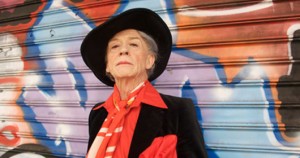An Englishman in New York
 As a divisive figure in the then-burgeoning gay rights movement, writer-actor Quentin Crisp is worthy of being given a lengthy biopic, or at least one that gives equal time to arguing the ways he both helped and harmed the gay cause. An Englishman in New York, which covers Crisp’s life as a latter day theater and television provocateur from the mid-1970s to his death in1999, is not that movie.
As a divisive figure in the then-burgeoning gay rights movement, writer-actor Quentin Crisp is worthy of being given a lengthy biopic, or at least one that gives equal time to arguing the ways he both helped and harmed the gay cause. An Englishman in New York, which covers Crisp’s life as a latter day theater and television provocateur from the mid-1970s to his death in1999, is not that movie.
At only 75 minutes (70 minutes pre-credits), director Richard Laxton’s An Englishman in New York only has time to skim the surface, with Crisp reduced to appearing to be a sexless, second-rate Oscar Wilde, dropping catty witticisms to his hungry and supportive theatrical audiences. We get set-ups for major ups and downs in Crisp’s life, from his stardom as an unfiltered TV guest on talk shows to his mouth getting him into trouble when he called AIDS nothing more than “a fad.” But An Englishman in New York, which, after its film festival run, had a number of airings on the LOGO channel, only offers pit stops, with major figures in his life showing up as special guest stars and quickly exiting (such as Swoosie Kurtz as his agent, Jonathan Tucker as a needy gay painter, and Cynthia Nixon as his theatrical partner Penny Arcade).
 The way that the theater shows are set up, An Englishman in New York suggests that Crisp simply responded to audience queries with half-baked sexual retorts, like Mae West in a gray wig, while Penny Arcade performed burlesque as bookends. In essence, that’s what the movie is too; a vaudeville show with hero-worship.
The way that the theater shows are set up, An Englishman in New York suggests that Crisp simply responded to audience queries with half-baked sexual retorts, like Mae West in a gray wig, while Penny Arcade performed burlesque as bookends. In essence, that’s what the movie is too; a vaudeville show with hero-worship.
 However, as Quentin Crisp, John Hurt nearly saves the day. Reprising his role from Crisp’s groundbreaking 1975 TV movie The Naked Civil Servant, Hurt bypasses all of the rushed details (the early scenes, with their musical and clothing choices, seem to be shopping exclusively at the 1970s cliché store) and the notion that An Englishman in New York would never have been made had Sting not written a song about Crisp. Hurt is so comfortable as Crisp, that he exceeds even the real Quentin Crisp in charm and clueless vulnerability (such as Crisp’s willingness to respond to every homophobic insult thrown his way). Hurt adds irony to a scene about gay cloning, because in a sense, we prefer Hurt to the original. Hurt truly gives us a sense of Crisp’s purposeful isolationism and how he tried to turn it into a unique form of happiness. In moments such as when Crisp plans his own funeral, Hurt transforms Crisp from a cuddly little old man being all cute and nihilistic, to a harrowing portrayal of a man dealing with his own irrelevance.
However, as Quentin Crisp, John Hurt nearly saves the day. Reprising his role from Crisp’s groundbreaking 1975 TV movie The Naked Civil Servant, Hurt bypasses all of the rushed details (the early scenes, with their musical and clothing choices, seem to be shopping exclusively at the 1970s cliché store) and the notion that An Englishman in New York would never have been made had Sting not written a song about Crisp. Hurt is so comfortable as Crisp, that he exceeds even the real Quentin Crisp in charm and clueless vulnerability (such as Crisp’s willingness to respond to every homophobic insult thrown his way). Hurt adds irony to a scene about gay cloning, because in a sense, we prefer Hurt to the original. Hurt truly gives us a sense of Crisp’s purposeful isolationism and how he tried to turn it into a unique form of happiness. In moments such as when Crisp plans his own funeral, Hurt transforms Crisp from a cuddly little old man being all cute and nihilistic, to a harrowing portrayal of a man dealing with his own irrelevance.



